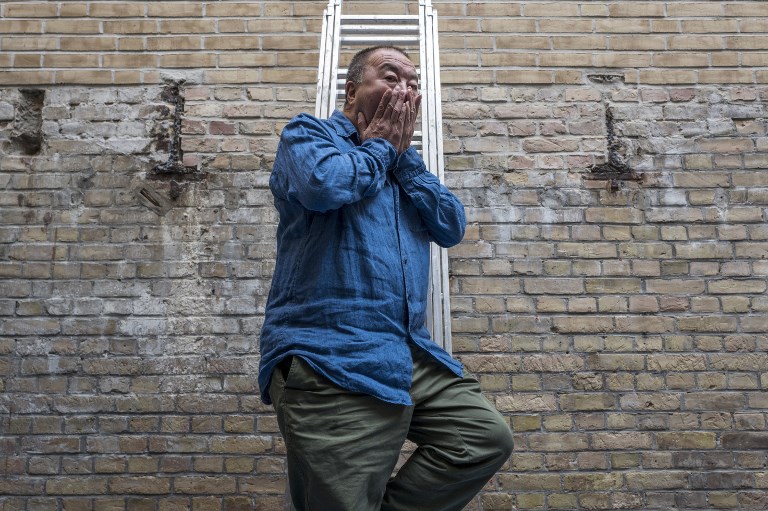
/ AFP Photo / John Macdougall
by Hui Min Neo
© Agence France-Presse
BERLIN, Germany (AFP) — A decade since the devastating earthquake in China’s Sichuan province that left more than 87,000 people dead or missing, activist artist Ai Weiwei concedes that Beijing will never provide a full reckoning of the disaster.
“We will never get a straight answer. Since the communist government was set up, the truth behind all major historical events has never been officially revealed,” the conceptual artist told AFP at his studio in Berlin.
Ai was among the volunteers and rescuers who rushed to Sichuan in the immediate aftermath of the 7.9 magnitude earthquake that devastated the region on May 12, 2008, flattening entire villages.
An outpouring of grief soon turned into fury as it emerged that thousands of children were killed in 7,000 schools that collapsed entirely, sparking allegations that corruption had led to shoddy building work.
But as bereaved parents pressed for answers from authorities, they were met with a stony silence, while Ai said he was detained and beaten by police who blocked him from testifying at the trial of an activist investigating the school collapses.
Only in May 2009 did the government say that 5,335 children were killed in school collapses — a number that was in fact far below figures given by state media previously. No official list of the victims was released.
An official investigation into construction standards for schools was promised but the results have not been published.
Ten years on, Ai is still enraged by the government’s stonewalling.
“Of course I’m still furious. Nothing has changed in this matter. It concerns people’s rights and dignity, the government’s responsibilities, lies and corruption,” he said.
‘Shock is too mild’
In the aftermath of the earthquake Ai began investigating the so-called “tofu schools” — a term likening their structural instability to the popular soft bean curd dish.
The probe sought to determine how much of the damage was wrought by natural disaster and how much was exacerbated by to human error, as well as to uncover “how this government that calls itself the people’s party deals with the people’s suffering”.
But his activism came at a high personal price.
Once the artist commissioned to help design Beijing’s Bird’s Nest Olympic stadium, Ai found himself at the receiving end of the state’s wrath.
He was beaten by police who blocked him from testifying at the trial of another activist, Tan Zuoren, who had separately investigated the school collapses. Ai was detained in 2011 for 81 days and had his passport confiscated for four years.
“All that has to do with our insistence on finding out the truth, insistence on investigating the list of dead students. Insistence on getting the government to tell us how these buildings were constructed.”
In 2010, Ai underwent surgery in Germany to relieve pressure on his brain from a blood clot which he said was the result of the police beating in Chengdu.
The operation happened just ahead of an exhibition in Munich, where Ai produced an installation using 9,000 backpacks writing out in Chinese: “She lived happily for seven years in this world” — a sentence from the letter of a mother of a schoolgirl killed in the quake.
“The government has the duty to provide information because it is a servant who works for you. You can’t say your servant doesn’t tell you what he’s used your money to buy, or how many chairs are in your house or where your bed is.
“If he doesn’t tell you anything, then he’s no longer your servant. He’s even tougher than the boss. If you ask these questions, he can beat you and even lock you up. How can you not be shocked? More than shocked. Shock is too mild. Furious.”
‘Government won’t change’
Despite the uproar over the school collapses then, Ai said the government hasn’t changed its approach.
If a new disaster were to strike, “the government wouldn’t do anything differently,” he said.
“It can’t change. The moment it tells the whole truth, it would no longer exist… Covering up the truth is a basic condition for the existence of an authoritarian regime.”
But Ai rejects any notion that his efforts were in vain.
“I didn’t make any sacrifices, I did what I should and, in fact it is what I think everyone should do. It is an individual’s responsibility to ask questions that have a bearing on their lives.
“The question of whether it’s worth it or not therefore does not exist.”
Ai eventually moved to Berlin after Beijing returned his passport in July 2015.
For now, Ai does not see himself returning to China even in the case of another similar disaster.
“My work now is on global refugees. There are lots of issues and they are all linked… Any place where human rights are harmed is a disaster for everyone’s human rights.
“I’m not (in China) now, I’m in Europe, where I’m faced with the refugee problem. So I’m facing it and making my voice heard on this problem.”
© Agence France-Presse







